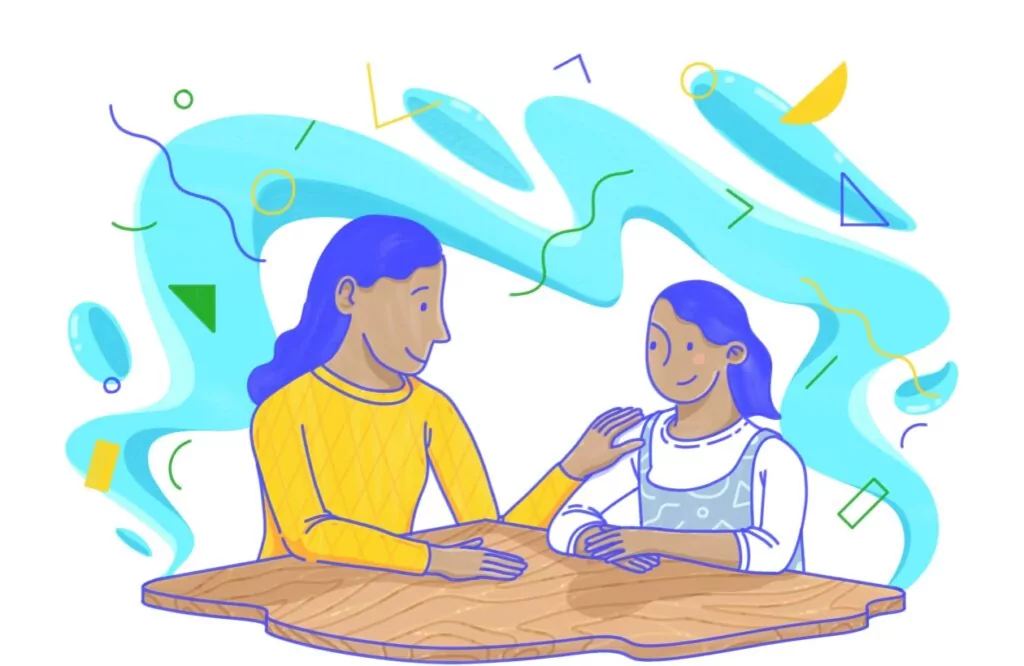See also: Preparing Your Child for Early Puberty Series #4: Treatment Shots
Whether your daughter is about to embark on normal, post-treatment puberty, or premature menstruation is one of her CPP symptoms, periods can be a loaded topic! Your daughter likely has lots of questions—and possibly some anxiety. She may wonder: Will it hurt? When will I start menstruating…and what if it happens at school?
By initiating an honest conversation with your daughter, you can empower her to thrive throughout her cycle.
Tone is everything
Talk about menstruation as though it’s a normal bodily function and it’s nothing to be embarrassed of—because that’s the truth!
Assure your daughter that it’s not too painful
Kids (reasonably) associate bleeding with pain, so your daughter might be scared that her period will hurt. Make it clear that menstrual bleeding, itself, shouldn’t hurt, but do warn her that she might get cramps that feel like an ache in her lower belly. Period cramps aren’t fun, but the two of you will find a way to ease any hurt—whether that involves a hot water bottle, light exercise, or a kid’s Ibuprofen.
Prepare her for mood changes
PMS, or premenstrual syndrome, is incredibly common among menstruating women. Let your daughter know that she might feel unusually cranky and physically sore before her period, and that’s normal. If you see any signs of depression, however, like a change in grades or social withdrawal, be sure to talk to your pediatrician as this could be a sign of PMDD (premenstrual dysphoric disorder).
Don’t assume your daughter already knows anything
No matter how old your daughter is, it’s possible that her health education classes haven’t covered menstruation (and that’s even more likely if your daughter is experiencing a premature period). Give her all the basics, namely: her body is preparing her for the ability to one day have a baby—even though she’s not an adult and she won’t have to decide whether or not to become a mother for many years.
Prepare a ‘Period Kit’ and show her how to use it
Teach your daughter how to use menstrual pads. Then pack her a small, discreet bag with pads, cleansing wipes, and a change of underwear that she can keep in her backpack so she’s always ready. She could consider packing a dark colored sweatshirt to tie around her waist in case of emergencies, too!
Teach her not to fall into the comparison trap
Kids develop at different times, and if your daughter has CPP, she might be developing more quickly than her peers. Whenever her period comes, you’ll make sure she’s ready for it—and that’s all that matters!
Show her how to track her period
Menstruation apps can teach your daughter a great deal about herself: maybe she can usually rely on her cycle to last around 28 days, or maybe she can expect to feel a little more tired during her ovulation phase. Depending on your daughter’s age, learning more about her unique body could be extraordinarily beneficial as she grows!
Use your resources
If you feel uncomfortable or unsure about how to answer your daughter’s menstruation questions, contact her physician for help. You can also read The Care and Keeping of You together to cover all your bases.
Talk openly about her period
When answering your daughter’s questions, remain nonjudgmental and present. In families where periods aren’t discussed, some girls menstruate for years without support before working up the courage to tell their parents. In your home, reinforce that menstruation is nothing to be ashamed of, offer your wisdom if you have it, and seek help if you don’t! Just keep showing up for your daughter, and she’ll gain the tools she needs to care for herself throughout her life.
See also: Preparing Your Child for Early Puberty #6: Body Odor
TPI.2021.3013.v1 (v1.1)




